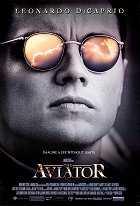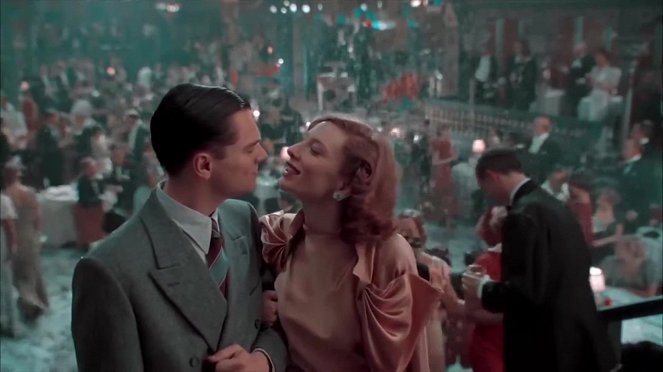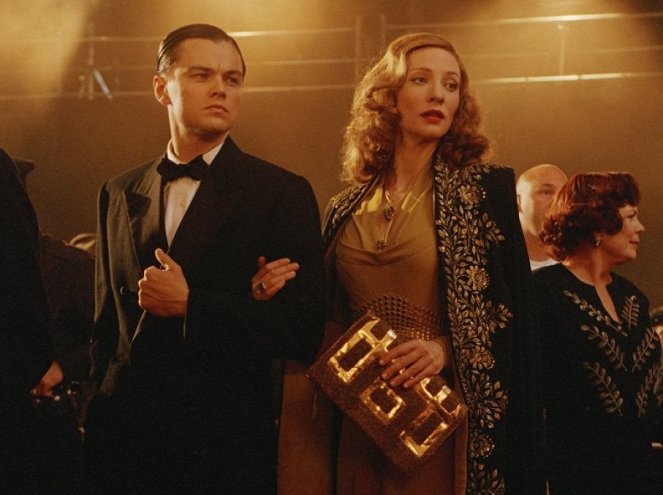Directed by:
Martin ScorseseScreenplay:
John LoganCinematography:
Robert RichardsonComposer:
Howard ShoreCast:
Leonardo DiCaprio, Cate Blanchett, Kate Beckinsale, John C. Reilly, Alec Baldwin, Alan Alda, Ian Holm, Danny Huston, Gwen Stefani, Jude Law, Adam Scott (more)VOD (2)
Plots(1)
Howard Hughes was a wily industrialist, glamorous movie producer and unstoppable American innovator – but thought of himself first and foremost as an aviator. In this spectacular epic, director Martin Scorsese focuses on the most prolific period in the life of Hughes: the mid-1920s through the 1940s. It was a time of brilliant aeronautical invention, turbulent love affairs and savage corporate battles. Prepare yourself for the ride of a visionary lifetime. (Miramax Films)
(more)Videos (3)
Reviews (11)
This is the second time I have seen this Scorsese film, as I couldn't endure it all the way to the end the first time due to its length and my lack of interest, and I was missing about 40 minutes to settle the score with The Aviator. I was able to erase it from my memory practically perfectly in record time, and that already proves that this time Martin and I didn't see eye to eye. Honestly, it's probably the film I most could not get into from this famous American filmmaker in the last two decades. While his recent films managed to impress me, The Aviator only bored and disinterested me. Despite being undoubtedly a blockbuster with everything that belongs to it - a multitude of stars, a high budget, a script overflowing with ambition, and a charismatic hero - something doesn't work in it, and it's not just because the theme didn't appeal to me. Scorsese describes his hero in a way that is very different from the reality that could resemble how Costa Gavras settles accounts with capitalism in his film Capital. The real Howard Hughes was such a scoundrel that even Belfort, the main character of The Wolf of Wall Street could be considered a good buddy from Sunday school and Mother Teresa's secretary. Even an American like Leacock noticed the typical characteristic of Americans - admiring successful people regardless of how they came to wealth and how they handled it and made fun of it in his book "Literary Lapses." In the United States, Howard Hughes is considered a legend, even though his real behavior, actions, and impacts were very problematic. In the movie, there is one scene where Howard is visiting Katharine Hepburn's family, which represents that typical inward-looking snobbish liberal society that drowns in wealth while prattling about socialism. When the lady of the house says that they never talk about money in their house, Howard responds, "That's because you have plenty of it." Howard Hughes was the last person who could pass any judgments. He inherited the money and then enjoyed it and lived the typical life of a playboy and celebrity. He treated his employees thoughtlessly, manipulated, blackmailed and lobbied in the worst imaginable way, which meant nothing other than mass corruption. Even his illness is highly debatable; in the 1940s, he certainly didn't suffer from any mental illness, and, typically, he was able to manage his companies so skillfully until the end of his life that he never paid a penny in taxes while being one of the five richest people on this planet. I'll give it three stars thanks to several great scenes, such as the crash of the airplane and its impressive flight through a residential area, where Scorsese presents himself in the best possible form. But it's just barely three stars... Overall impression: 50%.
()
A stunning cinematic work by a true artist, both in image and acting. I wasn't bored even for a minute, the runtime was okay, I actually wouldn't have minded a bit more. And the emotional impact on me was all the greater because I have dealt with obsessive compulsive disorder in my life, so I know exactly what Scorsese was talking about, and that he didn't miss the mark is evidenced by the feelings of one of my friends, also OCD, who was shocked to find himself in the character of Howard Hughes. So, thank you Sir.
()
One of those films for which Leo should have gotten the Oscar instead. It's a great performance by him, but it's not the film's only strength. Scorsese's direction is so confident that he even allows himself an exorbitant runtime because he knows he won't be boring the audience. The last two hours mesmerized me so much that, for the second time, I couldn't tear myself away from the film.
()
This film should be called Howard Hughes, and the subtitle could be "DiCaprio Flying to the Stars". It'd be easy to say that Scorsese has lost his grip for once, especially the in second part, when the story gets out of hand, but anyone who lets the whole film sink into their head and understands the concept should admit that it could hardly have been made better. For us here overseas, The Aviator will have a hard time, a viewer who has never heard of Hughes can expect anything from it based on the premise or even the poster, but in the end they will probably get something completely different. It's a spectacular narrative built entirely on the complex and idiosyncratic character of the aviation mogul, or rather, on the excellent performance of Leo DiCaprio, which in my opinion was the starting point of his tremendous acting form that continues uninterrupted to this day. Hughes's personality and fascinating life are explored so thoroughly and interestingly in the space of 160 minutes that you simply can't take your eyes off the screen in order to see how it all plays out. And it wouldn't be Scorsese if he didn't come up with a hugely impressive and academically appealing production design and invite a whole host of stars to play the supporting roles; they do an excellent job and complement Leo, who barely leaves the screen (besides the Oscar-winning Blancett, it's worth mentioning Senator Alda, the master of supporting roles Reilly and the beautiful Beckinsale). For the uninitiated, it's a more challenging spectacle and I can't say I outright enjoyed it, but it's still a film with capital F, the likes of which only a few top directors can make (and have made) :) 80%
()
After the not-so-favorably received (but brilliant in my opinion) Gangs of New York, director Martin Scorsese has ventured into slightly more recent history. He tells the story of an extraordinary person in an extraordinary style. A man who can be perceived as either a genius or a madman. You have to choose whether you will admire Howard Hughes for pushing the boundaries of technological and human capabilities or despise him for his obsessively guarded cleanliness or instability in relationships. Martin Scorsese gives you both sides of the story in a unique trip back to the early 1930s and late 1940s. The atmosphere of parties, bars, women, cigarettes, and unique music breathed so strongly on me that it tousled my hair. And in this environment, Leonardo DiCaprio moves with his characteristic elegance. The acting challenge was truly formidable. DiCaprio picked up the thrown gauntlet and, with a performance more than dignified, proved to everyone that he truly knows how to act. The entire film is full of one famous name after another. While I'm not particularly a fan of Cate Blanchett, neither physically nor as an actress, I must reluctantly praise her. Alan Alda as Hughes' main antagonist is absolutely superb. A lot of people fault the film for the story going nowhere at times. I strongly disagree. I attentively watched the entire three hours to see what was happening. Visually, the film is perfect. Some scenes are indelibly etched in my memory. For example, the filming of Hell's Angels or the plane crash between houses in Beverly Hills. Robert Richardson's brilliant cinematography adds the final touch to everything. Not only the period music but also Howard Shore's orchestration perfectly contributed to creating the (already perfect) atmosphere. Everything I've listed here should be enough to give The Aviator four stars, but the film has something that makes me want to give it no less than five. It has soul. The soul that allowed it to live and tell. Thank you, Master.
()



Ads